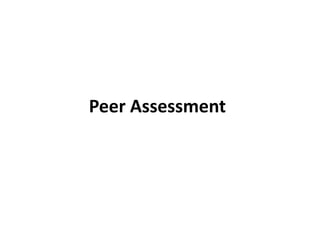
Peer assessment
- 2. Peer Assessment • What is it? – Assessing the work of others against an official assessment criteria. • Why do it? – To give others useful feedback and hints on how they can improve their work – To help ourselves understand more about how our work is marked and reflect on our own work – To get ideas on how to improve our own work
- 3. Design Cycle • We have just completed the Analysis stage of the Design Cycle. • This included: – An introduction to the problem/task/Unit Q – Researching answers to your guiding questions – A Design Brief – A Design Specification – A Test Plan – An evaluation of your performance so far
- 4. Assessing this work • We need to assess this work against the Assessment Criteria, which is…
- 5. The Terminology • Pay close attention to the words in bold on the criteria. They mark the difference between the levels that are awarded…
- 6. Your First Task • You need to get into pairs • You have 25 minutes to assess someone else’s Analysis work that I will provide you with • You need to make sure you are very strict with the marking against the criteria • You need to make sure the student has included all the different sections of work and that nothing is missing • Fill in the feedback sheet I have linked to on the blog
- 7. Task Two: Feedback • We will now feed back to the students who’s work you have marked in a class discussion. • Discuss the level you have given and reason why you have given that level. • Any suggestions for improvements? • Anything you think the person did very well?
- 8. Task Three • Your next task is to consider your own work and identify some areas for improvement. • You have been studying the Assessment Criteria throughout this lesson and have hopefully considered whether your own work meets the highest level of this criteria. • It is unlikely that everyone in this class has already achieved a level 6 for this, so take 10 minutes to consider what level you consider your work to be and then list some ideas for improvements that can raise your work up a level.
- 9. Homework • Carry out the improvements you have suggested in the last activity in order to improve your work and raise its level.
